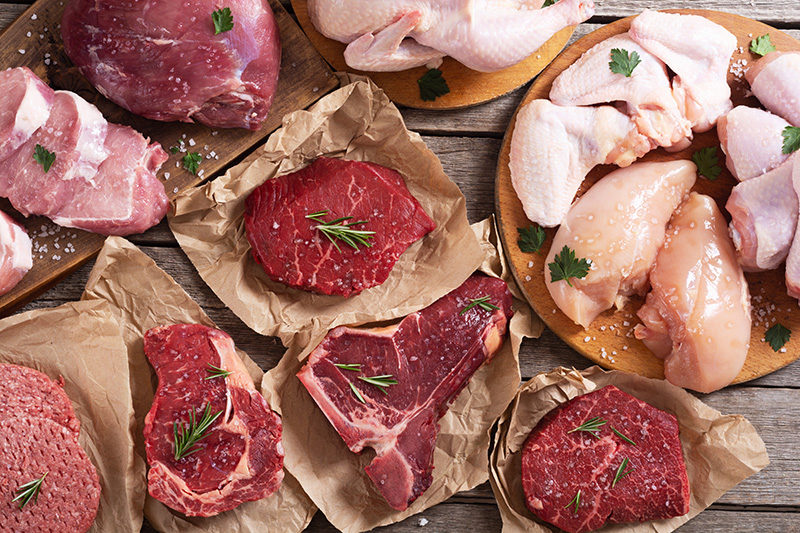More Health and Nutrition Bites
Related
Red meat: yeah, we knew that
A study published recently in the American Journal of Clinical Nutrition appears to show that consuming a moderate amount of lean beef, in conjunction with a Mediterranean-style diet, improved cholesterol scores significantly compared to the Average American Diet.
Mushrooms vs. Meat
I love mushrooms. With only about 15 calories per cup, they're a good source of fiber and are also a good source of Vitamin D, selenium, and folate (especially important for women of child-bearing age). The best part? They're cheaper than the same amount of beef.
Lean, unprocessed red meat part of a heart-healthy diet - and may help with weight loss
The truth, as you know if you've been following Dr. Gourmet for a while, is that processed meats like bologna, bacon, and sausage are far greater risks to your health than lean, unprocessed red meats like beef (from cows), lamb, and pork (not 'the other white meat').
Health & Nutrition Bites
Get the latest health and diet news - along with what you can do about it - sent to your Inbox once a week. Get Dr. Gourmet's Health and Nutrition Bites sent to you via email. Sign up now!
Instead of red meat

If you've spent your life as an omnivore - that is, eating land animal proteins such as beef and pork (red meat) and poultry such as chicken and turkey (white meat) - along with (perhaps) fish and shellfish, then the news that red meat isn't great for you might hit a little close to home.
There are those in the health and nutrition field who would like you to believe that the only healthy diet is a vegan diet. (Vegan = consuming no animal products whatsoever.)
The Beef Board, the folks behind the slogan, "Beef. It's what's for dinner," and the Pork Board ("the other white meat") would like you to believe otherwise.
The truth for most people, however, is somewhere in between.
Sure, there are those who will make the switch to a vegan diet and will stick to that style of eating for the long term. It requires a serious commitment and requires that they change nearly everything they eat - from breakfast to snacks to what to eat if and when they eat out.
Many people, however, are far more likely to fall on "the enemy of better is perfect" side of things: faced with their physician's edict to switch to a vegan diet - a far cry from their usual diet - they'll give up on changing their diet at all.
The good news is that giving up red meat doesn't mean giving up all land animal protein: a Mediterranean-style diet allows for a weekly average of less than 4 ounces of land animal protein (both red and "white" meat) per day (3 1/4 ounces for women).
But does switching from red meat, whether processed or unprocessed, to another animal protein really make that much of a difference? In a study recently published in the British Journal of Nutrition (2022;127:563-569), A team of Dutch researchers analyzed dietary data from a prospective study to assess the participants' risk of death from cancer or heart disease - with the added twist of modeling what might happen if a participant substituted poultry or fish for an equivalent amount of red meat.
The prospective study is known as the Diet, Cancer and Health Study and began recruitment in the Copenhagen area in 1993. Just over 57,000 men and women between the ages of 50 and 64 responded to a dietary questionnaire, with 63 different questions covered meat intake of all types. They also responded to demographic and lifestyle questionnaires as well as providing health information.
For this analysis those participants who reported having cancer, high blood pressure, poor cholesterol scores or diabetes were excluded from the analysis, which ended in 2015. Using access to the Danish National Patient Register and the Cause of Death Register, the researchers were able to review the cause of death for all participants who passed away over the course of the study, which allowed them to compare those deceased participants' diets with those who were still alive at the end of the study.
When the authors substituted a single 150-gram serving (about 3.5 ounces) of fish or poultry for the same amount of red meat in a participant's diet, was there all that much of a difference in risk of death?
Yes and no. The greatest difference was seen in overall risk of death (from any cause) and in risk of death from cancer when fish was substituted for processed meats such as sausage or smoked meats such as bacon. How much of a difference? About 9% at best. Substituting poultry for processed red meat? About the same.
What about fish or poultry for UNprocessed red meat? Once again, the risk was slightly reduced, but not to a clinically significant degree.
What this means for you
The take home message here is that multiple small dietary changes - like choosing fish or poultry in place of a serving of red meat - can add up to a much healthier diet overall. Yes, processed meats, whether beef, pork, or otherwise, aren't good for you, so if you must have them, save them for a treat. But you can enjoy your fish, shellfish, and poultry - again, in moderation - without guilt.
First posted: April 13, 2022
